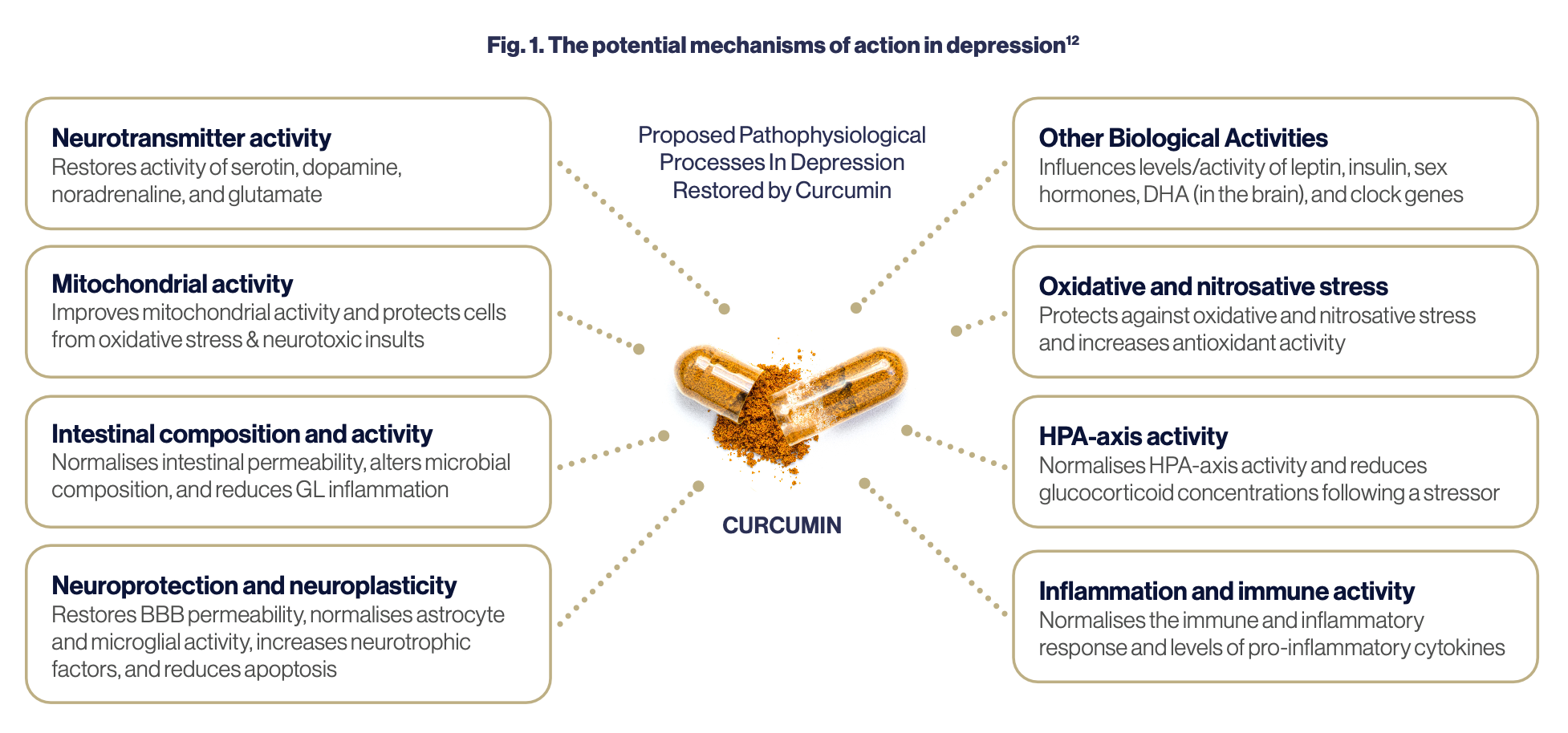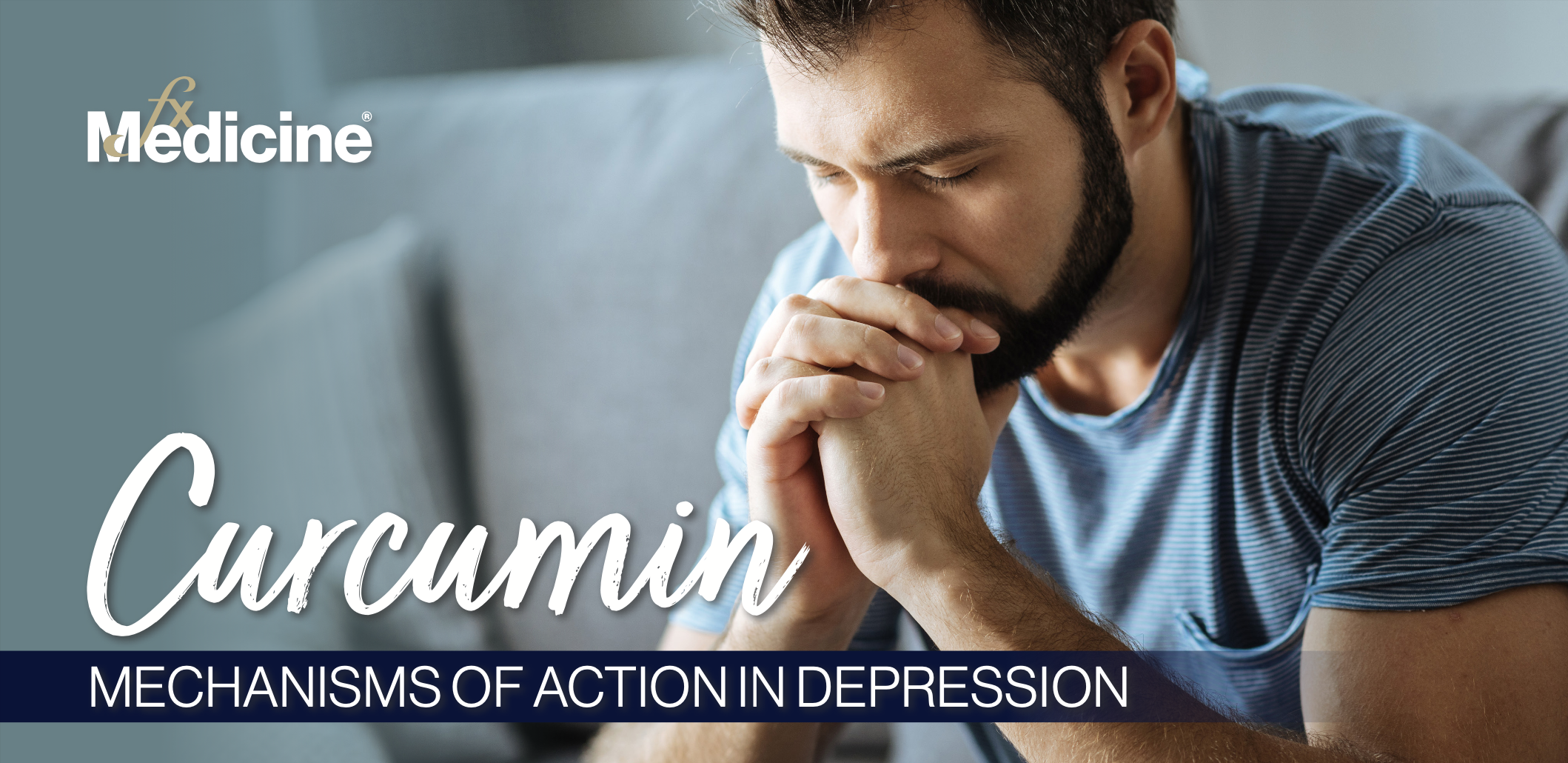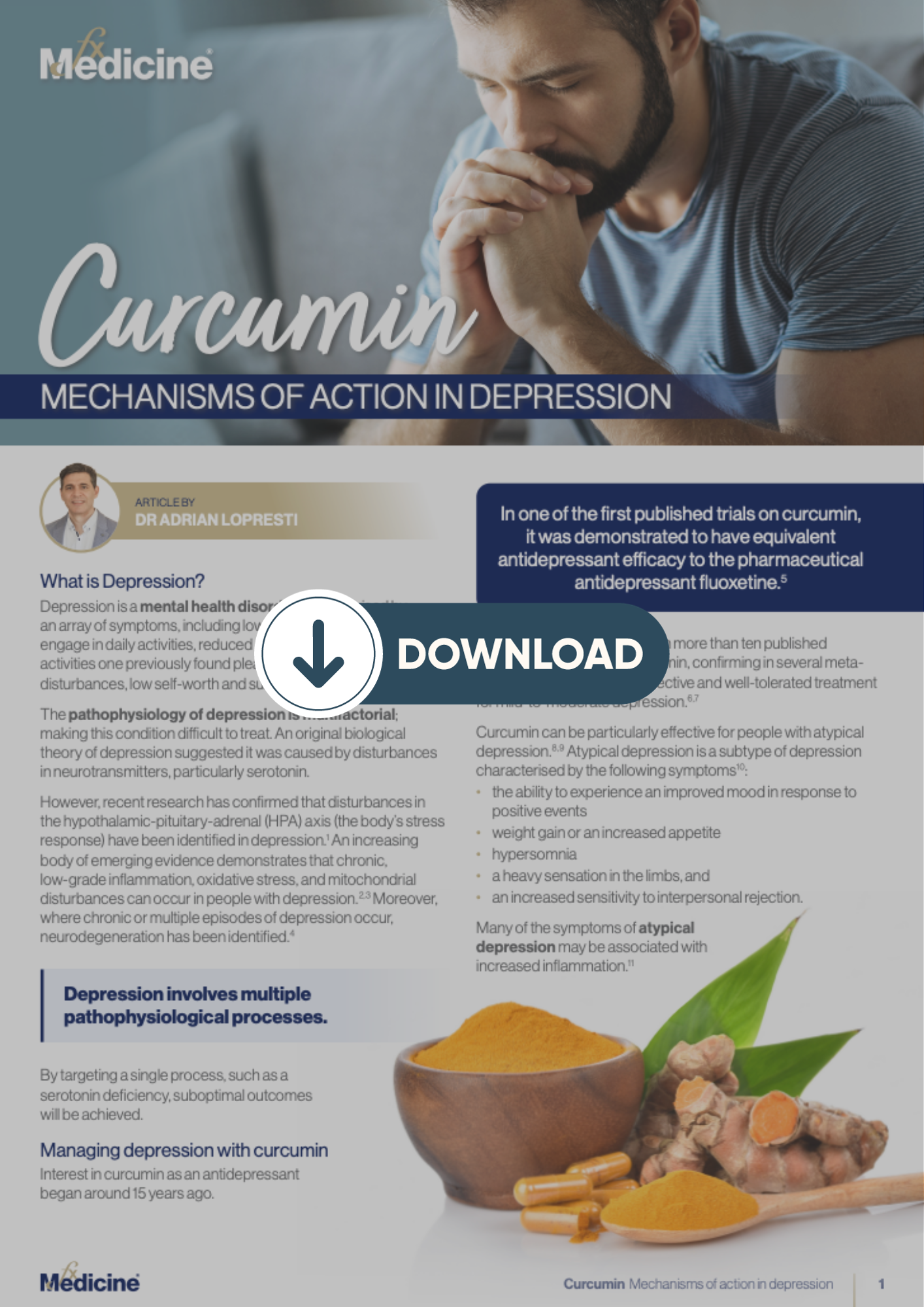What is Depression?
Depression is a mental health disorder characterised by an array of symptoms, including low mood, reduced drive to engage in daily activities, reduced pleasure and interest from activities one previously found pleasurable, sleep and appetite disturbances, low self-worth and suicidal ideation.
The pathophysiology of depression is multifactorial; making this condition difficult to treat. An original biological theory of depression suggested it was caused by disturbances in neurotransmitters, particularly serotonin. However, recent research has confirmed that disturbances in the hypothalamic-pituitary-adrenal (HPA) axis (the body’s stress response) have been identified in depression.1 An increasing body of emerging evidence demonstrates that chronic, low-grade inflammation, oxidative stress, and mitochondrial disturbances can occur in people with depression.2,3 Moreover, where chronic or multiple episodes of depression occur, neurodegeneration has been identified.4
Depression involves multiple pathophysiological processes. By targeting a single process, such as a serotonin deficiency, suboptimal outcomes will be achieved.
Managing depression with curcumin
Interest in curcumin as an antidepressant began around 15 years ago. In one of the first published trials on curcumin, it was demonstrated to have equivalent antidepressant efficacy to the pharmaceutical antidepressant fluoxetine.5 Since this trial, there have been more than ten published antidepressant trials on curcumin, confirming in several meta-analyses that it may be an effective and well-tolerated treatment for mild-to-moderate depression.6,7
Curcumin can be particularly effective for people with atypical depression.8,9 Atypical depression is a subtype of depression characterised by the following symptoms10:
- the ability to experience an improved mood in response to positive events
- weight gain or an increased appetite
- hypersomnia
- a heavy sensation in the limbs, and
- an increased sensitivity to interpersonal rejection.
Many of the symptoms of atypical depression may be associated with increased inflammation.11
The action of curcumin
Curcumin targets many pathophysiological processes found to be disturbed in depression (See Figure 1).12 Curcumin’s anti-inflammatory effects are well recognised; its ability to reduce both peripheral and possibly neuroinflammation may account for its mood-enhancing effects. Several neurotransmitters, such as serotonin, dopamine, noradrenaline, and glutamate are influenced by curcumin via its impact on receptor sensitivity and its ability to increase concentrations of these neurotransmitters.
Curcumin is a potent antioxidant. Excess oxidative stress has regularly been identified in people with depression. Curcumin’s mood-enhancing effects result from its ability to protect the brain from the damaging effects of oxidative stress. Several studies show curcumin may influence HPAaxis activity by reducing concentrations of cortisol. Excess cortisol can reduce mood and increase anxiety.
Curcumin also has neuroprotective effects by restoring blood-brain-barrier permeability, normalising astrocyte and microglia activity, also increasing neurotrophic factors such as brain-derived neurotrophic factor. Other mechanisms of action associated with curcumin intake include its influence on mitochondrial activity, it’s ability to normalise intestinal permeability and positively alter the microbial composition, incorporating sleep-related changes and education about lifestyle or environmental changes to minimise exposure to environmental pollutants.

Curcumin in clinical practice
As a treatment for low mood or depression, curcumin’s therapeutic effects are not rapid; it should be administered for at least eight weeks. In most clinical trials, benefits have been identified after four to eight weeks. Although no studies have investigated the long-term effects on mood, curcumin should be taken for at least 6 months to help maintain mood improvements.
A curcumin extract that has been specifically investigated in clinical trials on depression is recommended; a dose of 250 to 500 mg, twice daily. Where minimal mood improvements occur after two to six weeks, consider increasing the dose to 500 or 1,000 mg twice daily for greater antidepressant effects. It is however essential to monitor the emergence of gastrointestinal symptoms in patients; higher doses can trigger digestive discomfort in some people. Where a patient is taking a pharmaceutical antidepressant such as a selective serotonin reuptake inhibitor (SSRI), curcumin can be co-administered; there are no significant contra-indications.
If patients ask about simply adding turmeric to their diet rather than taking curcumin supplements, inform them that while turmeric may have many health benefits, strong antidepressant effects will not be an outcome.
Interest in botanicals as natural antidepressants is increasing, and curcumin is one of the leaders in this area. In conjunction with psychological, dietary, environmental and lifestyle changes, curcumin presents as a key component within a holistic approach for the treatment of depression.
Download a PDF version of this article
References
1. Du, X. and T.Y. Pang, Is Dysregulation of the HPA-Axis a Core Pathophysiology Mediating Co-Morbid Depression in Neurodegenerative Diseases? Front Psychiatry, 2015. 6: p. 32.
2. Casaril, A.M., R. Dantzer, and C. Bas-Orth, Neuronal Mitochondrial Dysfunction and Bioenergetic Failure in Inflammation-Associated Depression. Front Neurosci, 2021. 15: p. 725547.
3. Ait Tayeb, A.E.K., et al., Major Depressive Disorder and Oxidative Stress: A Review of Peripheral and Genetic Biomarkers According to Clinical Characteristics and Disease Stages. Antioxidants (Basel), 2023. 12(4).
4. Zhang, F.F., et al., Brain structure alterations in depression: Psychoradiological evidence. CNS Neurosci Ther, 2018. 24(11): p. 994-1003.
5. Sanmukhani, J., et al., Efficacy and Safety of Curcumin in Major Depressive Disorder: A Randomized Controlled Trial. Phytotherapy research : PTR, 2014. 28(4): p. 579-85.
6. Wang, Z., et al., The efficacy and acceptability of curcumin for the treatment of depression or depressive symptoms: A systematic review and meta-analysis. J Affect Disord, 2021. 282: p. 242-251.
7. Ng, Q.X., et al., Clinical Use of Curcumin in Depression: A Meta-Analysis. J Am Med Dir Assoc, 2017. 18(6): p. 503-508.
8. Lopresti, A.L., et al., Curcumin for the treatment of major depression: a randomised, double-blind, placebo controlled study. J Affect Disord, 2014. 167: p. 368-75.
9. Lopresti, A.L. and P.D. Drummond, Efficacy of curcumin, and a saffron/curcumin combination for the treatment of major depression: A randomised, double-blind, placebo-controlled study. J Affect Disord, 2017. 207: p. 188-196.
10. Pae, C.U., et al., Atypical depression: a comprehensive review. CNS Drugs, 2009. 23(12): p. 1023-37.
11. Franklyn, S.I., et al., Developing symptom clusters: linking inflammatory biomarkers to depressive symptom profiles. Transl Psychiatry, 2022. 12(1): p. 133.
12. Lopresti, A.L., Potential Role of Curcumin for the Treatment of Major Depressive Disorder. CNS Drugs, 2022. 36(2): p. 123-141.



